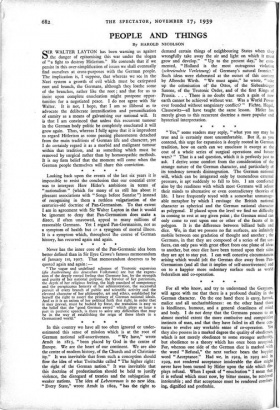In this country we have all too often ignored or
under- estimated this sense of mission which is at the root of German national self-assertiveness. " We have," wrote Arndt in 1815, " been placed by God in the centre of Europe. We are the heart of our continent. We are also the centre of modern history, of the Church and of Christian- ity." It was inevitable that from such a conception should flow the idea of what Treitschke called "The higher right: the right of the German nation." It was inevitable that this doctrine of predestination should be held to justify violence, the disregard of treaties and the subjugation of weaker nations. The idea of Lebensraum is no new idea. " Every State," wrote Arndt in 1802, " has the right to demand certain things of neighbouring States when they wrongfully take away the air and light on which it must grow and develop." " Up to the present day," he com- mented, " Holland is the most outrageous violation (schreiendste Verletzung) of Germany's natural frontier." Such ideas were elaborated at the outset of this century by Albrecht Wirth. " We must again," he wrote, " take up the colonisation of the Ottos, of the Siebenbtirger Saxons, of the Teutonic Order, and of the first Kings of Prussia. . . . There is no doubt that such a gain of new earth cannot be achieved without war. Was a World Power ever founded without sanguinary conflict? " Fichte, Hegel, Clausewitz—all have taught the same lesson. Hitler has merely given to this recurrent doctrine a more popular and hysterical interpretation.




































































 Previous page
Previous page